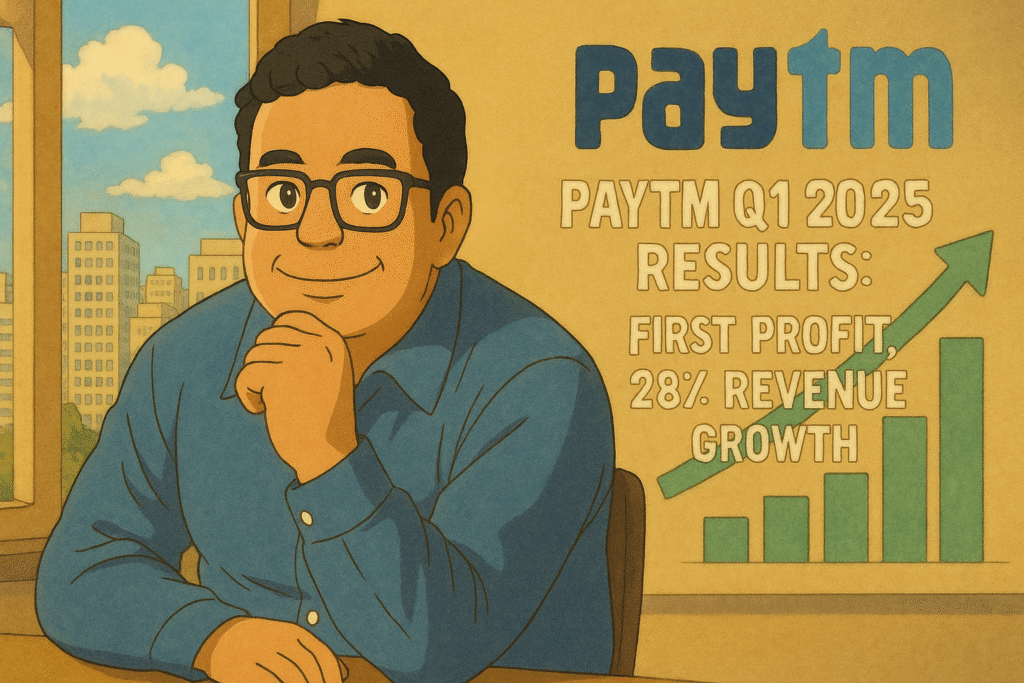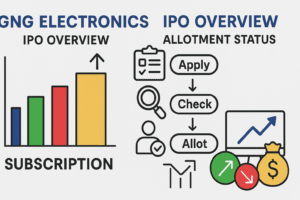
Paytm Q1 2025 Results: First Core Profit & 28% Revenue Growth
How Paytm turned the corner with AI, cost cuts, and a smarter business model — and what it means for India’s fintech future.
Published on July 25, 2025 | Updated with latest financial data
Paytm, India’s most recognized digital payments platform, has achieved a landmark milestone in Q1 FY26 (April–June 2025): its first-ever operational net profit of ₹123 crore. This marks a historic turnaround from the ₹839 crore net loss reported in the same quarter last year, signaling a major shift from aggressive growth to sustainable profitability.
The results reflect a strategic transformation across Paytm’s business — driven by 28% year-on-year revenue growth to ₹1,918 crore, aggressive cost optimization, and the increasing role of artificial intelligence in operations. Unlike previous quarters where profits were inflated by one-time gains (like the sale of its entertainment business), this profit stems from core business improvements, making it a more reliable indicator of long-term viability.
• 📈 ₹1,918 crore revenue (+28% YoY)
• 💰 ₹123 crore net profit (first from core ops)
• 📉 19% drop in total expenses
• 🤖 AI automation in onboarding, fraud detection, and support
• 🔁 Shift to non-DLG lending reduces balance sheet risk
Revenue Growth: Beyond Transaction Volume
Paytm’s revenue growth wasn’t just about more transactions — it was about smarter monetization. The ₹1,918 crore in operating revenue represents a 28% increase from ₹1,501 crore in Q1 FY25. This growth was fueled by three key areas:
- Subscription-based merchant services: Paytm now has 1.3 crore subscription merchant devices deployed — an all-time high. These merchants pay recurring fees for digital tools, improving revenue predictability.
- Financial services distribution: Revenue doubled to ₹561 crore, driven by merchant loans, insurance, and equity broking — most under low-risk non-DLG models.
- Net payment revenue: Up 38% to ₹529 crore, thanks to better pricing, lower disputes, and higher transaction quality.
Perhaps most impressively, the contribution margin expanded from 50% to 60%, meaning a larger share of revenue is now flowing directly to profitability — a sign of improved unit economics.
Profitability: Cost Cuts Meet AI Efficiency
Revenue alone wouldn’t have delivered profit. Paytm slashed total expenses by 19% — from ₹2,476 crore to ₹2,016 crore — through disciplined cost management.
Marketing spend dropped 55% to ₹100 crore, reflecting a move away from cashback-driven user acquisition. Employee costs fell 33% to ₹643 crore, still 32% of total expenses, indicating workforce optimization and automation gains.
Meanwhile, AI systems now handle merchant onboarding, real-time fraud monitoring, and customer support — reducing manual work and improving accuracy. These efficiencies helped Paytm achieve positive EBITDA of ₹72 crore, a first in recent history.
Operating Expenses (Q1 FY26)
- Employee Benefits: ₹643 Cr (32%)
- Payment Processing: ₹581 Cr (29%)
- Marketing: ₹100 Cr (5%)
- Other (Software, Legal, etc.): ₹692 Cr (34%)
Revenue Sources (Estimated)
- Payment Services: ₹529 Cr
- Financial Services: ₹561 Cr
- Merchant SaaS & Tools: ₹400 Cr+
- Other (Ads, Subscriptions): ₹428 Cr
Profitability Metrics
- Net Profit: ₹123 Cr
- EBITDA: ₹72 Cr
- Contribution Profit: ₹1,151 Cr
- Contribution Margin: 60%
Market Reaction & Challenges Ahead
Investors responded positively, with Paytm’s stock rising 3.5% post-earnings and up over 130% in the past year. However, challenges remain — including regulatory scrutiny after the RBI’s 2024 directive to shut down Paytm Payments Bank, and intense competition from PhonePe and Google Pay.
For long-term success, Paytm must scale its high-margin services without reverting to aggressive spending. The shift to non-DLG lending and AI-driven operations suggests the company is on the right path — but sustainability will depend on execution.
Frequently Asked Questions
On July 22, 2025.
Yes — ₹123 crore net profit from core operations, not one-time gains.
Subscription merchants, financial services, and better payment economics.








Post Comment